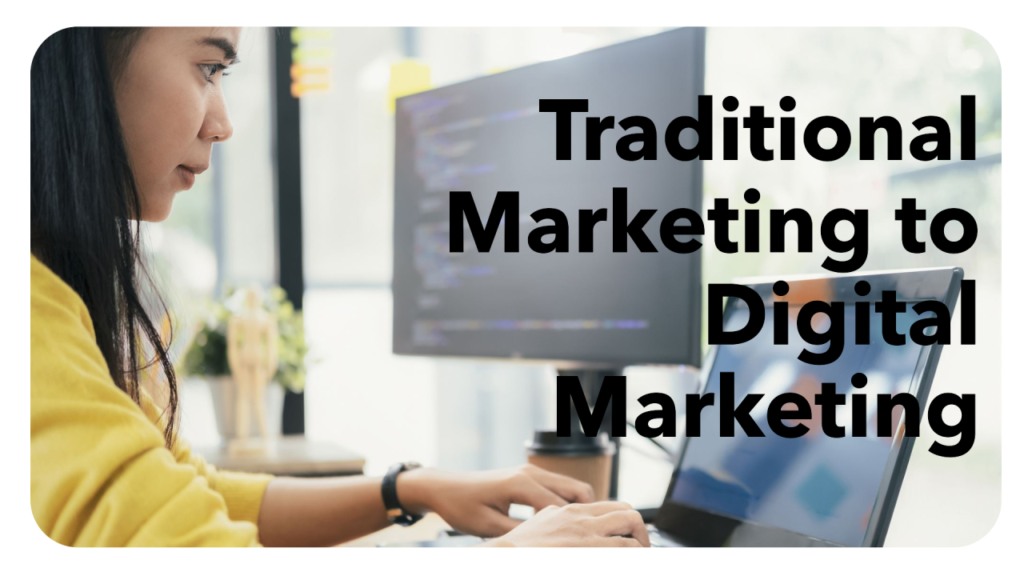In today’s rapidly evolving business landscape, marketing has undergone a massive transformation, moving from traditional practices such as print advertisements, billboards, and TV spots to more dynamic, data-driven strategies in the digital realm. This shift is due to the increasing dominance of the internet and the demand for more targeted, measurable, and efficient marketing tactics.
If you have experience in traditional marketing and are looking to transition into a digital marketing career, you’re not alone. Many professionals are making this leap, recognizing the growing importance of online marketing.
In this blog, we will guide you through the steps to successfully transition from traditional marketing to a digital marketing career, emphasizing the importance of enrolling in a digital marketing institute in Nagpur to gain the necessary skills and expertise.
Understanding the Differences Between Traditional and Digital Marketing
Before jumping into the transition, it’s crucial to understand the fundamental differences between traditional and digital marketing. Traditional marketing relies heavily on offline methods such as TV, radio, newspapers, and direct mail. While these techniques still hold value, they often need improvement in reach, targeting, and tracking effectiveness. Traditional marketing is also more expensive, especially when compared to digital marketing campaigns.
Digital marketing, on the other hand, operates in the online space and involves strategies like social media marketing, content marketing, search engine optimization (SEO), email marketing, pay-per-click (PPC) advertising, and more. The main advantages of digital marketing include the ability to precisely target your audience, track campaign performance in real-time, and adjust strategies quickly based on data. Digital marketing is cost-effective and provides more personalized interaction with customers.
How to Transition from Traditional Marketing to a Digital Marketing Career?
1. Recognize the Skills You Already Possess
One key aspect of transitioning into digital marketing is understanding that your background in traditional marketing is valuable. Many principles that apply in traditional marketing, such as understanding your target audience, crafting compelling messages, and creating a solid brand identity, are just as important in digital marketing. You’ll also find that skills like project management, market research, and campaign planning are transferable.
Your experience in traditional marketing has already given you a strong foundation in communication, problem-solving, and creativity. These soft skills are highly sought after in digital marketing and will make your transition easier.
2. Upskill with Digital Marketing Courses
While traditional marketing experience provides a good foundation, mastering the technical and analytical skills required for digital marketing is crucial. Enrolling in a digital marketing institute in Nagpur can help bridge the knowledge gap and equip you with the tools you need to succeed in the digital realm.
Digital marketing institutes offer comprehensive courses that cover essential topics such as SEO, social media marketing, Google Ads, content creation, email marketing, and web analytics. You will gain hands-on experience using the latest tools and platforms critical for running successful campaigns. Moreover, you’ll have the opportunity to work on live projects and build a portfolio, which is essential when looking to enter the job market.
Choosing the right digital marketing institute in Nagpur is critical, as these institutes provide expert mentorship, guidance, and practical training. Look for an institute that offers certifications, as these credentials can significantly boost your job prospects.
3. Learn the Tools of the Trade
Digital marketing heavily relies on tools and platforms to manage campaigns, track performance, and optimize results. As part of your transition, you should become familiar with key digital marketing tools like:
- Google Analytics: Used for tracking website performance and user behavior.
- Google Ads: For running paid search campaigns.
- SEMrush or Ahrefs: This is used to conduct keyword research and track SEO performance.
- Hootsuite or Buffer: Social media management platforms that help you schedule and track posts.
- MailChimp or HubSpot: Email marketing automation platforms.
- WordPress: A popular content management system for creating and managing websites.
A digital marketing institute in Nagpur will guide you through the usage of these tools, giving you the technical know-how to design and execute effective marketing strategies.
4. Build an Online Presence
In the world of digital marketing, your online presence is your resume. Start by building your professional profiles on LinkedIn, Twitter, and other relevant platforms. Regularly share industry insights, updates, and your thoughts on marketing trends. This shows that you are engaged with the digital marketing community and helps establish your authority.
Another essential step is creating a personal website or blog to showcase your expertise. Writing articles or case studies on digital marketing topics will improve your understanding and serve as proof of your knowledge to potential employers or clients. Many digital marketers also use their blogs to experiment with SEO strategies and content marketing, which adds to their practical learning experience.
5. Network with Industry Professionals
Like traditional marketing, networking plays a vital role in digital marketing. Attend workshops, webinars, and networking events hosted by your digital marketing institute in Nagpur. These events allow you to meet industry experts, learn from their experiences, and stay current on the latest trends and best practices.
Additionally, networking helps you build relationships that could lead to job opportunities. Engaging in online communities, such as LinkedIn groups or digital marketing forums, is another excellent way to connect with like-minded professionals and expand your industry contacts.
6. Embrace Data-Driven Marketing
One significant difference between traditional and digital marketing is the emphasis on data. Every action can be tracked, measured, and analyzed in digital marketing. You will need to familiarize yourself with key metrics such as click-through rates (CTR), conversion rates, cost per acquisition (CPA), return on investment (ROI), and more.
Data-driven marketing allows you to make informed decisions about your campaigns and optimize them for better performance. By enrolling in a digital marketing institute in Nagpur, you will better understand how to use analytics and data to improve marketing strategies. Knowing how to interpret data and turn insights into actionable plans is essential for success in digital marketing.
7. Consider Specializing in a Niche
Digital marketing is a broad field with many specializations, including SEO, content marketing, social media, PPC, email marketing, and more. As you begin your transition, focusing on one or two areas of digital marketing that align with your strengths and interests may be helpful.
For instance, if you have a background in content creation, you might find it easier to specialize in content marketing or copywriting. SEOyou’reC could be a better fit if you’re more analytical. Specializing in a particular area can help you stand out in the job market and position yourself as an expert.
8. Build a Portfolio with Real-World Projects
To secure a job in digital marketing, you need to demonstrate your skills and achievements. A portfolio is a great way to showcase your practical experience. Work on real-world projects by collaborating with local businesses, taking on freelance work, or completing assignments through your digital marketing institute in Nagpur.
Your portfolio should include examples of campaigns you’ve worked on, detailing the strategies you used and the results you achieved. It’s essential to show your creative and analytical abilities and proficiency with digital marketing tools.
9. Stay Updated with Industry Trends
Digital marketing constantly evolves, with new tools, algorithms, and strategies continually emerging. To remain competitive, it’s essential to stay updated with the latest trends and technologies.
To keep your knowledge current, follow industry blogs, subscribe to newsletters, and participate in webinars. Many digital marketing institutes in Nagpur provide continuous learning opportunities to help their students stay current with the latest industry developments.
10. Gain Certifications to Boost Your Credibility
Certifications are a great way to validate your digital marketing skills and enhance your resume. Platforms like Google, HubSpot, and Facebook offer free certifications in various digital marketing disciplines, including Google Ads, Google Analytics, inbound marketing, and social media marketing.
In addition, a certification from a reputable digital marketing institute in Nagpur will further strengthen your credentials and improve your job prospects. Employers often look for certified professionals, indicating you have the knowledge and practical skills to succeed.
Transitioning from traditional marketing to a digital marketing career is a rewarding journey that requires time, dedication, and the willingness to learn new skills. By leveraging your existing marketing experience, upskilling through a digital marketing institute in Nagpur, and staying committed to continuous learning, you can successfully make this transition and thrive in the ever-growing digital marketing industry.
With the right guidance, networking, and hands-on experience, you’ll be well on your way to establishing a successful digital marketing career that opens up new opportunities and growth in the dynamic world of online marketing.




